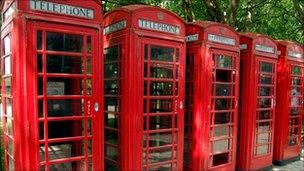BT says quarter of phone boxes in Wales rarely used
- Published

The familiar K6 phone box design was created in 1936 and is still popular today
Almost a quarter of public phone kiosks in Wales make less than one call a month, latest figures show, but BT says it has no immediate plans to wield the axe.
Public phone use has dramatically fallen in the past couple of years, with only 3% of adults saying they had used a BT payphone in the last month.
At the same time, mobile phone ownership has soared to around 90% of adults and, with an Ofcom ruling last week likely to lead to cheaper calls, they have never been more affordable.
Academics even suggest many young people view kiosks as some kind of museum piece and would as likely be seen in one as go out dancing with their parents.
But despite the odds seemingly being stacked against them, reports of the humble payphone's demise are greatly exaggerated.
More than 3,800 survive in Wales down from about 4,300 in 2008, when BT's last major review took place.
BT says it has no pressing plans for another big review, although with each payphone costing on average £700 a year to maintain, economic pressures exist.
Many politicians are willing to make the case for keeping phone boxes due to their social value.
South Wales West AM Peter Black has spoken out in the past to save kiosks under threat.
"I think the issue is that most people have mobile phones these days but there's large areas of Wales that don't have mobile phone coverage and the pay phone is a valuable safety net," he said.
"If someone breaks down or is in any emergency and there's no signal, then the pay phone is a safety net."
Payphones can also provide access to child and domestic abuse helplines - a vital service if the caller does not own a mobile phone or does not want to risk a call showing up on a bill.
BT does admit it keeps a close eye on its payphones "because use has declined over the years".

BT has tried to make phone boxes more user friendly and 'relevant'
"They are providing a valuable service to the community and will continue to do so," said a spokesperson.
"There are a lot of people out there who do use kiosks and who don't have mobile phones.
"But their [use] is falling year on year and there's no suggestion that's going to stop."
The spokesperson said BT was always looking at ways of making phone kiosks "relevant", with internet access in some and their use for advertising.
Many communities are also keen to preserve them.
The company has encouraged communities to adopt those that have been decommissioned with some used as mini libraries or art galleries.
There is more than whiff of nostalgia about preserving phone boxes, particularly the red kiosks, as people recall their youth, possibly making calls to girlfriends or boyfriends.
But communications expert Professor Robin Mansell, of the London School of Economics (LSE), said younger people may view them in a different light to their parents.
"I think they have an iconic kind of meaning to people over a certain kind of age, in Britain particularly but everywhere," she said.
"But I think the cultural priorities are changing quite radically for the younger people generally.
"The notion that you can go to a public phone box will vanish."
However, Professor Mansell said that before phone boxes were removed in rural or disadvantaged areas, a solution needed to be found to how people might raise the alarm in an emergency.
"The question is really a policy matter. When the companies say it's too costly, we will take them out of service, policy makers need to look at the range of alternatives and agree to provide some degree of connectivity in an emergency."